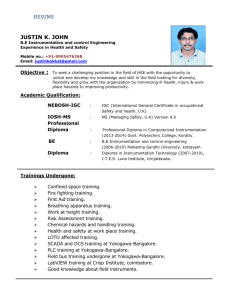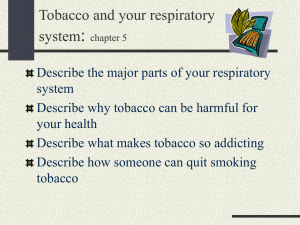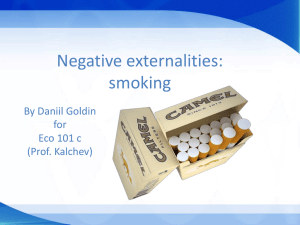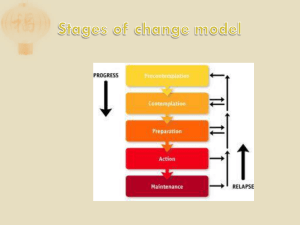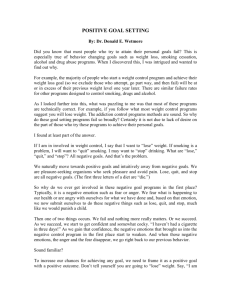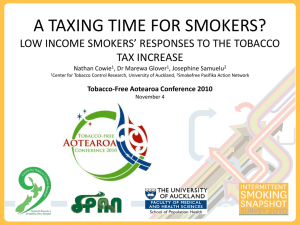Stamp Out Smoking Sample Activities
advertisement
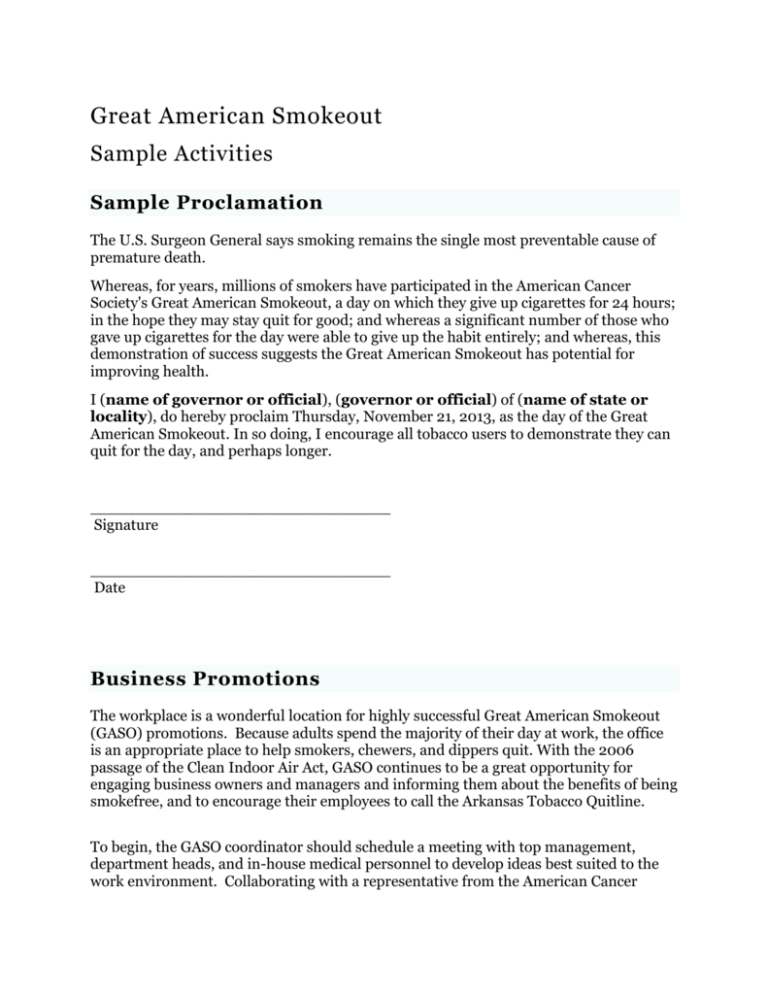
Great American Smokeout Sample Activities Sample Proclamation The U.S. Surgeon General says smoking remains the single most preventable cause of premature death. Whereas, for years, millions of smokers have participated in the American Cancer Society's Great American Smokeout, a day on which they give up cigarettes for 24 hours; in the hope they may stay quit for good; and whereas a significant number of those who gave up cigarettes for the day were able to give up the habit entirely; and whereas, this demonstration of success suggests the Great American Smokeout has potential for improving health. I (name of governor or official), (governor or official) of (name of state or locality), do hereby proclaim Thursday, November 21, 2013, as the day of the Great American Smokeout. In so doing, I encourage all tobacco users to demonstrate they can quit for the day, and perhaps longer. _______________________________ Signature _______________________________ Date Business Promotions The workplace is a wonderful location for highly successful Great American Smokeout (GASO) promotions. Because adults spend the majority of their day at work, the office is an appropriate place to help smokers, chewers, and dippers quit. With the 2006 passage of the Clean Indoor Air Act, GASO continues to be a great opportunity for engaging business owners and managers and informing them about the benefits of being smokefree, and to encourage their employees to call the Arkansas Tobacco Quitline. To begin, the GASO coordinator should schedule a meeting with top management, department heads, and in-house medical personnel to develop ideas best suited to the work environment. Collaborating with a representative from the American Cancer Society, American Lung Association, or other reputable organizations can add support and provide easy access to their materials, literature, posters, videos, and educational programs. When planning these activities, consider all employees, including hourly, shift, and parttime workers. Remember to include union or labor relations staff in any GASO planning committees you organize. Promotional ideas that have worked in the past include: Send flyers asking employees to participate in GASO and letting them know about the planned activities before GASO. Hold an informal sign-up breakfast for smokers and nonsmokers who have "adopted" a fellow employee. Hand out GASO materials and treat the participating employees to juice and muffins. Create a competition between departments or regional offices to collect the most "kept" pledges to quit smoking. Ask nonsmokers to give up something to empathize with smokers. Design pledge cards for the nonsmokers so they can indicate what they will give up, such as coffee, chocolate or soft drinks. Set up GASO stations where smokers can trade cigarettes or smokeless tobacco products for chewing gum, carrot sticks or lollipops to help them "lick" the habit. Make GASO part of an employee health promotion or wellness program. Arrange for blood pressure screenings, fitness activities and healthy diet counseling for smokers trying to quit and for nonsmokers as well. College Promotions Many college-age students have smoked for years and want to quit. Others may be starting for the first time. For the college administrator who is interested in having a positive impact on students' futures, participation in GASO can help save lives. On August 1, 2010, The Arkansas Clean Air on Campus Act went into effect. All state-funded colleges and university campuses have been smoke-free since, providing students with cleaner air. GASO is a great way for smokers to prove they can quit for a day and, therefore, probably for life. It is also the optimal time to reinforce prevention messages for students who may be contemplating starting to smoke. The campus coordinator can be a member of the college administration, teaching staff or student body. The coordinator should work with the local American Cancer Society for training and materials for the best GASO possible. The coordinator should have time to plan events, recruit volunteers and distribute promotional materials for GASO. The key to success is to hold GASO in a highly visible, popular place where students cannot miss the activities. The college "quad," student union or cafeteria entrance are ideal locations for GASO activities. Following are ideas proven effective in the past: Distribute GASO survival kits at the central location of GASO activities. Suggest a competition among campus fraternities and sororities to help smokers quit. Recruit the college radio station to include continuous coverage of campus events for GASO. Work with college newspaper staff to cover GASO activities on campus. Ask a photographer from the college yearbook staff to attend GASO activities to ensure that GASO memories are documented. Work with the education department to coordinate students who are majoring in education to visit local schools to student-teach children about the hazards of smoking. School Promotions Following are other ideas for programs in schools in conjunction with GASO. Incorporate anti-tobacco messages in curriculum, such as smoking experiments in science class, essays in English class on smoking, smoking equations in math class, and effects of smoking in health. For social studies class, review cigarette ads to determine whom tobacco companies target. Have students research and write stories for the school newspaper about the social and health consequences of smoking. Hold a contest for the best stop-smoking creation (e.g., song, debate, radio commercial, slogan, banner, cartoon, joke, comedy routine or no-smoking pledge). Organize high school or junior high students to put on a show for elementary school students in your district. The older kids learn from writing and producing a show while the younger kids learn from those they aspire to be. It's a fun idea that gets everyone involved. Encourage students to "adopt" their parents or other loved ones who smoke. Students can promise to provide moral support and keep a watchful eye on their charges who are trying to quit as part of GASO. Military Promotions It is important all employees of the U.S. Department of Defense maintain healthy lifestyles, so GASO is a natural promotion working well as an on-base activity. Following are some guidelines and ideas for the base coordinator to follow: Schedule a planning session with command supervisors, on-site medical personnel, and appropriate representatives who can help implement a base-wide campaign. If possible, include a local representative of the American Cancer Society to help coordinate activities. Set up GASO stations in recreation areas, clubs, dining facilities, and other central locations so quitters can trade their cigarettes and smokeless tobacco products for chewing gum, carrot sticks, popcorn, mineral water, sunflower seeds, lollipops and other snacks. Distribute posters and flyers about base GASO activities. Arrange for distribution of GASO payroll stuffers/flyers. Sponsor a competition among units. The unit with the highest percentage of smokers quitting could win a day off for all members. Include base newspapers, newsletters and other media in promotion plans. Use bulletin boards, marquees, public address systems, and regularly scheduled meetings to remind smokers of the approaching GASO activities. Display GASO posters wherever cigarettes and smokeless tobacco are sold. Place a large bin at the main entrance or in key buildings for personnel to dispose of cigarettes and smokeless tobacco products. Arrange a funeral for the discarded tobacco. Involve nonsmokers in a supportive Adopt-A-Smoker program. Ask nonsmokers to give up a favorite treat or activity for the day to empathize with smokers and "adopt" a friend to provide support.
